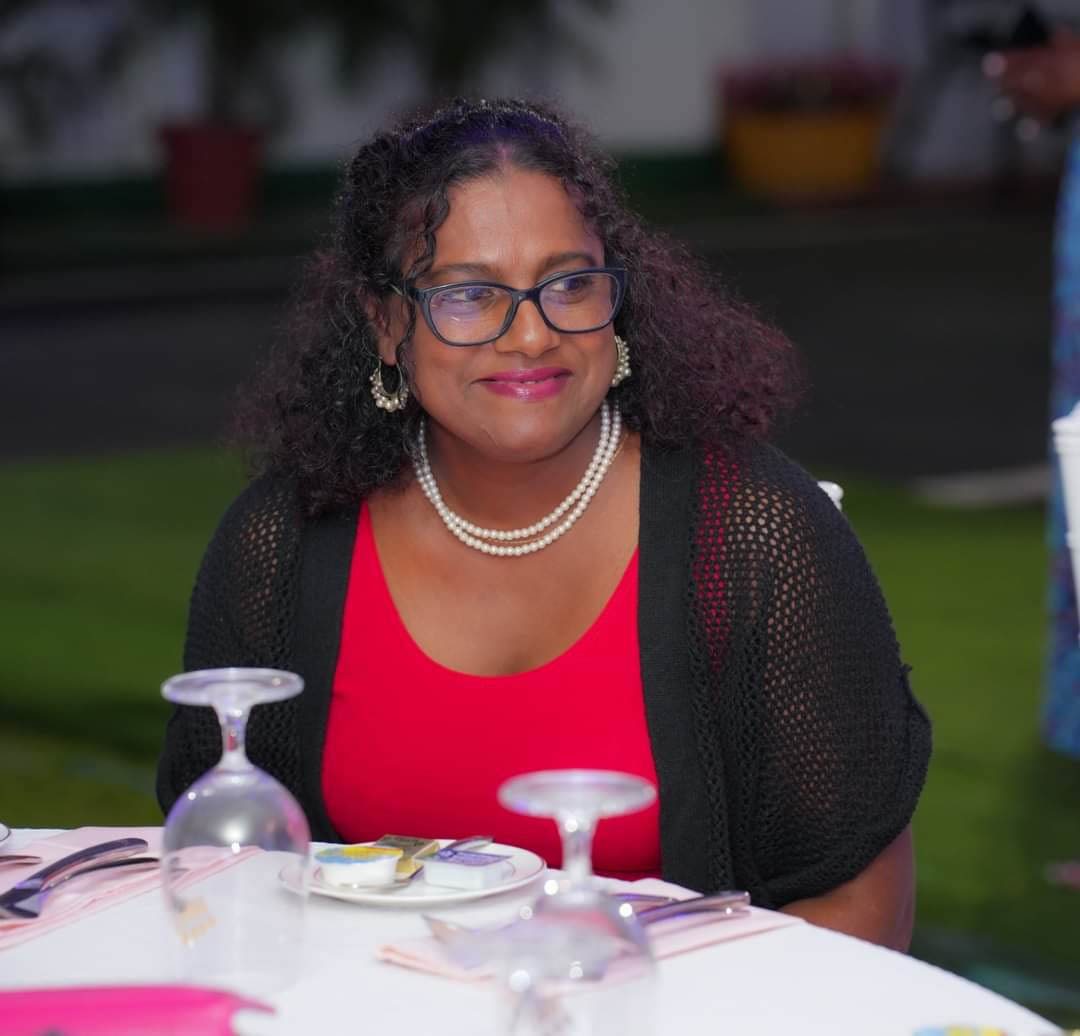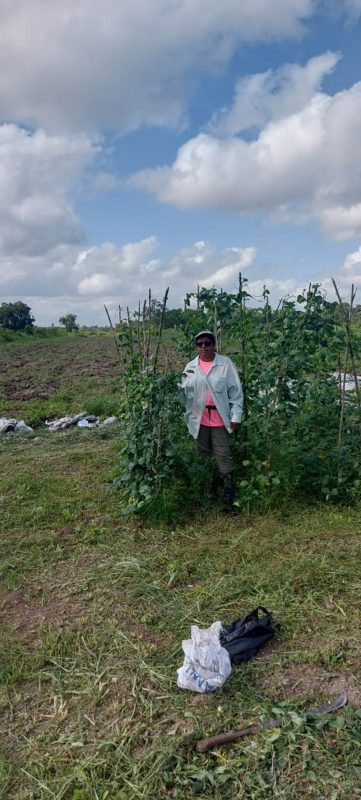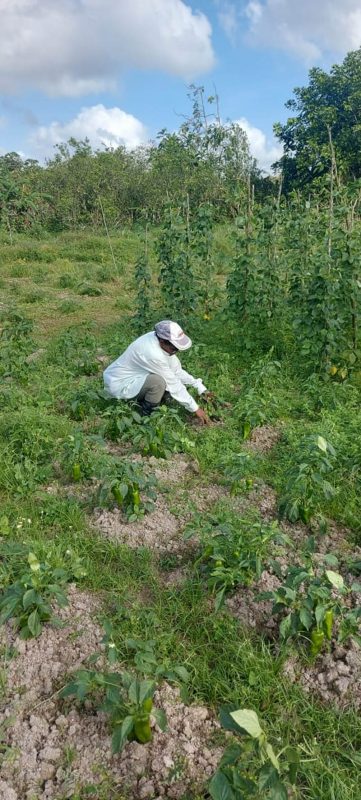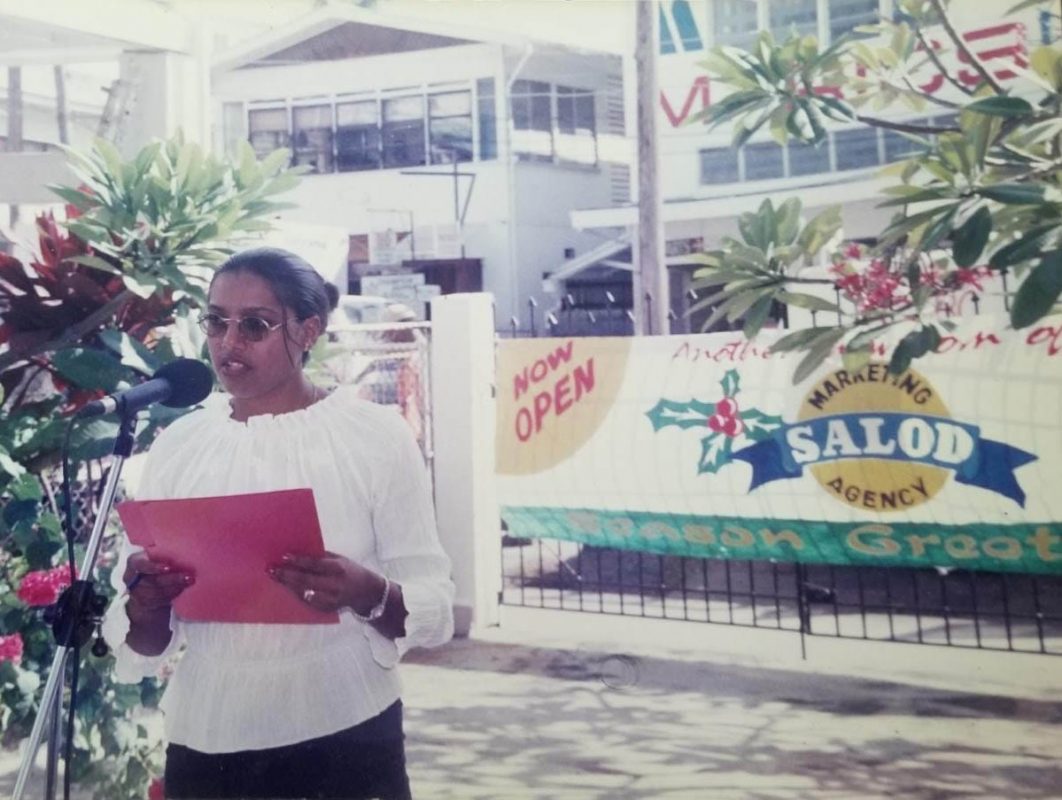Growth in small–scale agriculture is two to four times more effective at reducing hunger and poverty than any other sector, and women farmers are playing a central role. Jai Kumarie Persaud, who left business administration to become a farmer, is among those leading the momentum.
Born and raised in Georgetown, the 48-year-old mother of four was one of the featured speakers at a dinner hosted by President and First Lady Irfaan and Arya Ali on International Women’s Day at State House. Her drive, spirit and zeal for success have allowed her to accomplish many goals.
In an interview with this publication, she explained that her husband, Rattan Persaud, was a cane farmer when they met. At that time, she was an office administrator managing three branches for the company where she was employed, which sold office supplies.
She said, “Life at that time was just wake-up, work and classes.”
Persaud revealed that she had also completed a short stint as a teacher at the Sophia Special School during which time she completed a Diploma in Commerce. After that, she got into the office environment and majored in marketing at the University of Guyana.
Sharing the story of how she met her husband, she said that one day he had visited her office seeking assistance to fill out a Guyana Revenue Authority form. “They had sugar lands. I was working…. Thereafter we [started to] hang out and so the story went on,” she said.
After getting married, Persaud made a huge decision that would forever change the trajectory of her life. She decided to get involved in farming. It was something she had never envisioned herself doing, but thought it was necessary at that time to lend support to her husband.
“I still have classmates who … always say you turn over a full new leaf, because I represented my company well when I was managing,” she stated.
“I have four children, two boys, and two girls, when they were younger I would wake up at 4 am, make lunch and breakfast send everyone to school, go to the farm then collect them after school, prepare dinner, help my children with their homework and then prepare to do it all over the next day.”
Her efforts have not gone in vain. Her three eldest children have embarked on their own paths in different fields, while her youngest is preparing to write the Caribbean Secondary Education Certificate exams.
She recalled that when her children were very young she would take them to the farm where she does plants cash crops (her husband rears livestock) and would often breastfeed them there “and put them to sleep on logs, fallen mango tree logs.”
Even as they grew older, she said, “I would collect my sons from school midday and put them to lie on the log and they can’t fall off.”
Persaud said she found she had a love, an obsession for planting and reaping. “It is a very rewarding task. I do almost all the setting of the seeds. Most of the time I set my own seeds, buy tomatoes and peppers, and use those seeds. It is so rewarding…,” she revealed.
Over the years and in recent times she has met more and more women who are young, successful entrepreneurs involved in farming. “As I often tell my daughters,” she said, “there are no boundaries to your achievements and as President Irfaan Ali said, most women, what they start they make sure they finish.”
Persaud also revealed that she is extremely close with her siblings, especially since both of her biological parents have passed away. “We would go on family trips and go on drives and visit the missions. If we want to [we] hang out on the farm, fish, bush cook. I love to entertain family friends on the farm and I do pilot farming through NAREI [National Agricultural Research and Extension Institute] and GLDA [Guyana Livestock Development Authority]. A pilot farmer… showcases how and why we do things a certain way,” she said.
Cooperation
Persaud’s farm is located at Garden Eden on the East Bank Demerara, where they have about 25 acres, some 40% of which is used for farming. While her husband manages the livestock, that does not stop her from helping with the animals. “I do some of the vet work because of dealing with them every day I do some of the jobs. We have pigs; I would normally do vaccination. Young lambs give them the vitamins and if the cow has an issue the vet would leave the vaccination and I would do it,” she said.
She said that the cooperation with her husband is something that she truly appreciates, adding that she looks forward to ending her day and sharing notes with him as well as problem-solving.
Meanwhile, according to Persaud, the sub-offices of the Ministry of Agriculture have been very helpful in her farm life. She said that in addition to working closely with GLDA and NAREI, she also has a relationship with the Hydromet Office which shares a daily report of the weather patterns with her and that has been extremely useful.
“Farming has changed dramatically,” she noted, “especially because of the weather pattern and there are different ways you have to do things. You have to change, adapt… know when to plant certain crops and when you don’t.”
Sharing advice to young up-and-comers, Persaud said, “I would say to them education is the key to anywhere. First of all, you have to educate yourself and that’s the only means of success, don’t limit yourself ever. The sky is not the limit, don’t ever limit yourself. Whatever you want, work towards it and you’ll achieve it.”
She stated that there is frustration but it is important to take a moment to pause, reset and try again. As a current example, she shared, “a jaguar is attacking fowls right in our farmland in our pastures. The last attack was on March 7, and we get so frustrated. We’ve contacted GLDA and Wildlife and you get frustrated and don’t know what to do.
“Sometimes I worry my [second] son might be grabbed and as of now it has killed about 22 cows. It’s frustrating. The past three years it’s been very rapid but we don’t give up.”
Persaud has been a trailblazer in many instances. In 2003, when Bounty Supermarket opened for the first time at Grove, East Bank Demerara, she approached the management to offer packaged fresh vegetables, a trend that has since taken off in Guyana.
“I started to package first in plastics, thereafter I had a chat with the admins and I said we could try doing it on trays,” she recalled. “I imported a machine, started to buy trays and film wrap, and package them on trays. And eventually, I end up doing all the Bounty supermarkets in GT. [Then] I asked the DSL location downtown and on the East Bank. I did all the packaging. I did all the supplies.”
After years of doing this, Persaud realized that her days were getting shorter and she stopped the packaging process. “I couldn’t have managed it all even though I had workers doing packaging and workers at the farm,” she said. “I had one child in CXC and one in Grade Six at the same time and the task was overwhelming to be up with children working. Then my mother came and was diagnosed with cancer and she had six months more… It was too much on my plate.”
Mashramani is a sad time for her family. Her mother fell ill on the day after Mashramani in 2012, was diagnosed with stage 4 cancer and was given six months to live. “That was a shock, a literal shock. That was when my life started getting more difficult. Sometimes I would send my girls by her, and after [her diagnosis] I had no assistance. I had workers, the farm; I had my boys going to school,” she said.
“My mom [who passed away in 2012] was the most inspirational person you could think about. She was my support line for everything I do. she motivated me, and she brought out the best in me in every way.”












